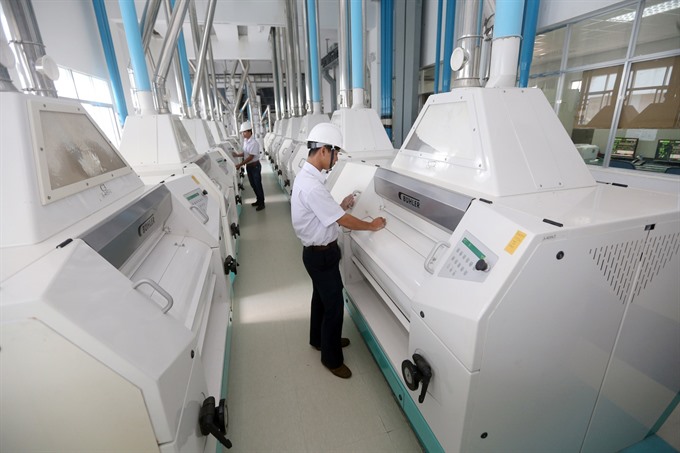 Economy
Economy

Việt Nam will institute new policies designed to attract foreign direct investment (FDI) by boosting the development of local companies and setting up value chains driven by advanced technologies.
 |
| A production line at Taiwan-funded Uni-President Việt Nam in Quảng Nam Province. - VNA/VNS Photo Danh Lam |
HÀ NỘI —Việt Nam will institute new policies designed to attract foreign direct investment (FDI) by boosting the development of local companies and setting up value chains driven by advanced technologies.
FDI has been a major factor in Việt Nam’s rapid socio-economic development; however, some key metrics remain below their expected levels. These include the involvement of local companies in the value chain and the development of the part supply industry. Transfer pricing, outdated technologies and environmental pollution are also significant problems.
Minister of Planning and Investment Nguyễn Chí Dũng said it is time for Việt Nam to consider changes in how it seeks to attract FDI. Changing global investment flow trends such as the US - China trade war, the rise of protectionism, opposition to multilateral free trade and the Fourth Industrial Revolution mean the country’s methods of attracting investments are outdated.
The country has taken lessons from its efforts to attract FDI over the last three decades, and the Government has recently stated that Việt Nam would not make too many sacrifices to attract investments.
Dũng said FDI should be associated with sustainable development, green growth, economic restructuring, boosting domestic industry and the Industry 4.0.
Dũng was quoted in a note on the ministry’s e-portal saying that while FDI is an important resource, it still accounts for just 25 per cent of total investment in the country. Domestic businesses still play a decisive role.
“We have to focus on developing and supporting domestic enterprises to unlock their production capacity,” Dũng said. The note also emphasised the importance of the link between FDI and domestic businesses.
He said the developmental gap between FDI companies and domestic industry makes it hard for them to connect. To remedy this, Dũng suggested focusing on boosting technology transfer in FDI attraction by selecting projects with advanced, environmentally friendly technologies.
“We must create favourable conditions for the development of domestic enterprises,” Dũng stressed. “When they develop to the level of FDI firms, the two sectors will automatically link with each other in the value chain.”
Việt Nam issued the Law on Supporting Small and Medium - Sized Enterprises and has developed the Centre for Innovation, which aims to help domestic firms work with FDI companies.
Dũng advocated for policies that would help Vietnamese firms acquire FDI companies, adding that it is necessary to aid local companies in obtaining technologies that enable them to take full advantage of the Industry 4.0.
According to Phan Hữu Thắng, former Director of the Foreign Investment Agency, Việt Nam should have proactive policies to encourage Vietnamese firms to purchase advanced technologies rather than waiting for them to arrive from FDI companies.
Technology transfer is difficult because nearly 80 per cent of FDI companies are entirely funded by foreign investment, Thắng said.
Buying technologies would help Vietnamese firms improve product quality, he said.
Because of limited budgets, Thắng said technology purchases should be done gradually by raising private capital and starting with key sectors.
It is also important to train workers to get the most out of new technologies.
In an interview with Vietnam News Agency, Director of the Ministry of Planning and Investment’s Foreign Investment Agency Đỗ Nhất Hoàng said it is important to take a broad view of technology transfer that includes purchasing technologies to manufacture products that meet the requirements of FDI companies.
Hoàng said whether domestic companies are proactive, the level of Government support and co-operation from partners were are critical factors in whether Vietnamese firms succeed in implementing global technologies.
As the world enters the Industry 4.0, Hoàng emphasised the importance of investing in advanced technology, saying the country needs to be more selective in attracting FDI to ensure sustainable development.
Hoàng also advocated establishing criteria to assess potential sources of FDI on their quality and sustainability, adding that finding ways to use FDI efficiently would boost the country’s socio-economic development.
State management agencies must do their part by enforcing policies that improve investors’ market access.
Hoàng said the ministry was reviewing the Law on Investment and the Law on Enterprise to remove overlapping and unreasonable regulations.
Ministry statistics show that Việt Nam has attracted US $334 billion of FDI into 26,500 projects with a disbursed capital of around $184 billion.
FDI has contributed to 52.8 per cent of the processing and manufacturing industry, created 50 per cent of the country’s industrial value and provided jobs for 3.6 million labourers. — VNS




